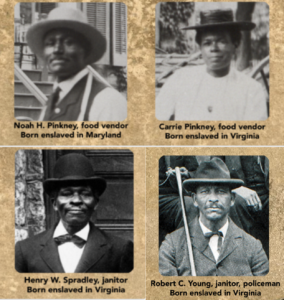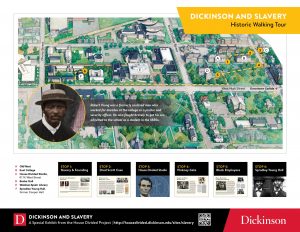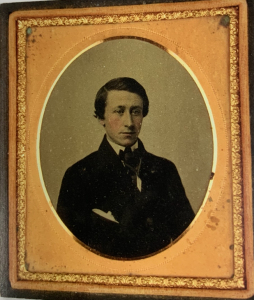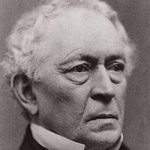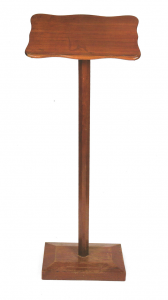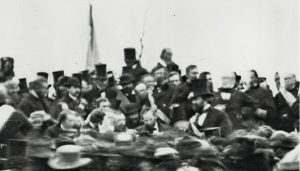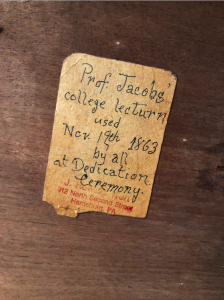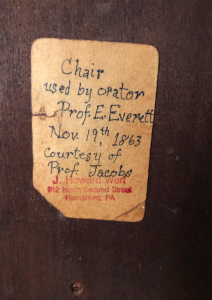On Saturday, November 20, 2021, the House Divided Project at Dickinson College will host two special events: a renaming ceremony as part of the Dickinson & Slavery initiative and a lecture by noted military historian Eric Wittenberg (Class of 1983) that will feature a public viewing of the original lectern from Lincoln’s Gettysburg Address.
Beginning at 1030am on November 20th outside of Old West on the main Dickinson campus, the House Divided Project at Dickinson will also host a special public renaming ceremony as part of the Dickinson & Slavery initiative. [NOTE –Bad weather alternate location = Weiss Center]. In May 2020, the Dickinson College Board of Trustees approved the renaming of East College Gate as Pinkney Gate, in honor of Carrie and Noah Pinkney, formerly enslaved food sellers who worked around campus in the late 19th and early twentieth century. The Board also approved the renaming of Cooper Hall as Spradley-Young Hall in honor of Henry W. Spradley and Robert C. Young, two longtime nineteenth-century Black employees and noted community leaders in Carlisle. The renaming ceremonies for Pinkney Gate and Spradley-Young Hall will begin at 1030am and end by 1130am on Saturday morning and will include remarks by President John E. Jones, III. Invited guests to the ceremonies include descendants of the nineteenth-century honorees as well descendants of other nineteenth-century Black employees. We are expecting dozens of descendants from all over the country to attend.
Livestreaing begins 1030am ET 11/20/21 and video will remain archived at this link for later viewing
In the afternoon, from 1pm to 4pm, the House Divided studio at 61 N. West Street will be open to visitors who would like to see the full Dickinson & Slavery museum exhibit. In addition, during this time, student interns will lead walking tours around the new Dickinson & Slavery wayside markers that have recently been installed around campus.
On Saturday evening, November 20, 2021, prize-winning military historian and Dickinson College graduate Eric Wittenberg (Class of 1983) will deliver the second annual J. Howard Wert keynote address from the lectern that was on the speaker’s platform at Gettysburg on November 19, 1863. Wittenberg will speak about some of the enduring myths from the Battle of Gettysburg. This event is free and open to the public and will be held at the Anita Tuvin Schlecter (ATS) auditorium (campus map). Doors open at 6pm for those who would like to view the lectern and other rare artifacts from the Gettysburg battlefield. Wittenberg’s lecture begins at 7pm and will continue until 815pm with a book signing to follow.
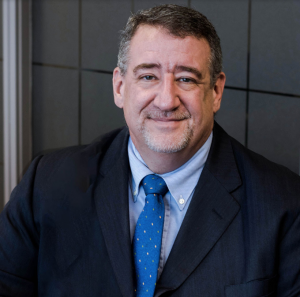 Eric J. Wittenberg is a proud member of the Dickinson College Class of 1983 and is an award-winning Civil War author. A native of southeastern Pennsylvania, after graduating from Dickinson, Eric was educated at the University of Pittsburgh School of Law and the University of Pittsburgh Graduate School of Public and International Affairs. He is a partner in the Columbus, Ohio law firm of Cook, Sladoje & Wittenberg Co., L.P.A., where he manages the firm’s litigation practice. Wittenberg is the author of 22 critically acclaimed books on the American Civil War, several of which have won awards, as well as more than three dozen articles published in national magazines. He is in regular demand as a speaker and tour guide, and travels the country regularly doing both. He serves on the boards of trustees of the Central Virginia Battlefields Trust and the Little Big Horn Associates, and often works with the American Battlefields Trust on battlefield preservation initiatives. He is also the program coordinator for the Chambersburg Civil War Seminars. His specialty is cavalry operations in the Civil War. He and his wife Susan reside in Columbus, Ohio.
Eric J. Wittenberg is a proud member of the Dickinson College Class of 1983 and is an award-winning Civil War author. A native of southeastern Pennsylvania, after graduating from Dickinson, Eric was educated at the University of Pittsburgh School of Law and the University of Pittsburgh Graduate School of Public and International Affairs. He is a partner in the Columbus, Ohio law firm of Cook, Sladoje & Wittenberg Co., L.P.A., where he manages the firm’s litigation practice. Wittenberg is the author of 22 critically acclaimed books on the American Civil War, several of which have won awards, as well as more than three dozen articles published in national magazines. He is in regular demand as a speaker and tour guide, and travels the country regularly doing both. He serves on the boards of trustees of the Central Virginia Battlefields Trust and the Little Big Horn Associates, and often works with the American Battlefields Trust on battlefield preservation initiatives. He is also the program coordinator for the Chambersburg Civil War Seminars. His specialty is cavalry operations in the Civil War. He and his wife Susan reside in Columbus, Ohio.
Livestreaing begins 7pm ET 11/20/21 and video will remain archived at this link for later viewing
The J. Howard Wert Lectureship is named in honor of J. Howard Wert (1841-1920), one of America’s great private collectors and pioneering educators. Wert was a young abolitionist and resident of Adams County, Pennsylvania who was present when Abraham Lincoln delivered his Gettysburg Address in 1863. The House Divided Project launched this annual lecture series in 2019 in partnership with the J. Howard Wert Collection and its current owner and curator, G. Craig Caba. Christy Coleman, former CEO of the American Civil War Museum in Richmond, Virginia, was the first Wert lecturer at Dickinson in 2019 to speak from the Gettysburg Address lectern. On March 21, 2020, the lectern will be on display along with a chair from the platform used by Edward Everett, the dedication ceremony’s main orator.
Background on the Collection
The J. Howard Wert Collection is considered one of the finest privately held collections of Civil War era artifacts in the country. Wert came from a prominent antislavery family in Adams County, Pennsylvania. The Wert family collected a number of important historical artifacts, dating back to the 18th century. Wert himself was a graduate of Gettysburg College who served as a scout for Union forces during the 1863 battle and was present for the Gettysburg Address later that year. Wert eventually enlisted in the Union army and became a teacher, author and noted school superintendent in Harrisburg. He died in 1920. During his lifetime, however, he was renowned for his collection of important historical artifacts. A 1910 newspaper profile claimed that Wert “had gathered a collection of relics at Gettysburg that could not be duplicated in any museum in the country.” In his own Gettysburg battlefield guide, which had been published in 1886 when he was forty-six years old, Wert wrote about how his collection of relics inspired him to try to recount the conflict for future generations:
As these lines are penned, from the walls around, cartridge-box and cap-box, bayonet and sword, canteen and canister, with a hundred other relics gleaned twenty-three years ago from the fields and woods we are now traversing, look mutely down upon the writer and vividly recall the sorrowful appearance of the bloated and distorted and blackened dead that lay close beside; noble, stalwart men were they, arrayed in garb of gray, who had bravely fought for what they deemed the right. (J. Howard Wert, A complete hand-book of the monuments and indications and guide to the positions on the Gettysburg battlefield, 1886, pp. 109-110)
Dedication Day, November 19, 1863
There are no eye-witness accounts or photographs from 1863 that actually depict the lectern or the chairs on the speaker’s platform. However, the photographs that do exist make very clear that the scene was more than a little chaotic and that most of the standing crowd would have had a limited view beyond the shoulder line of the speakers. Many of those present at the ceremony were impressed that the main orator Edward Everett seemed to have memorized his two-hour address, and some near the platform also remarked on how Lincoln slowly read his now much-more famous two-minute address, but few took note of other physical details from the platform itself. Yet, J. Howard Wert, then 22 years old, was definitely present at the ceremony. So was his friend, Henry Eyster Jacobs, a 19-year-old fellow graduate of Pennsylvania (later Gettysburg) College. His father, Michael Jacobs, was also there, and was at the time a professor at the college, writing a history of the battle. In fact, Prof. Jacobs had taken Everett on a tour of the battlefield in the days prior to the dedication ceremonies. We know this because Edwards himself mentioned the tour in his diary. Then, according to notes in the Wert Collection prepared decades later by J. Howard Wert, it was Professor Jacobs who provided his teaching lectern for the ceremony, along with at least one side chair, that was used by Everett, the former Massachusetts governor and U.S. senator while he was waiting to speak. These notes (previously unpublished), and various other relevant primary sources, including recollections by Wert and both Jacobs men, are provided below.
- Official select committee report & ceremony program (1864)
- Michael Jacobs book on battle (1864)
- Michael Jacobs article on touring battlefield: US Service Magazine with Part 2 (1864)
- J. Howard Wert battlefield guide (1886)
- J. Howard Wert recalling battle and cemetery dedication (1909): Part 1 and Part 2
- 1910 newspaper profile describing how Wert collected and annotated his battlefield relics
- Henry Eyster Jacobs on Gettysburg Address (1919)





